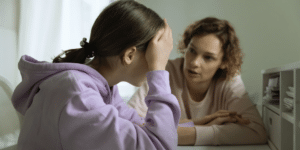Postpartum depression (PPD) is a serious mood disorder that can affect women after childbirth. It is estimated that 1 in 7 women will experience PPD at some point in their lives.
There are many different symptoms of PPD, but some of the most common include:
- Feeling sad, anxious, or hopeless.
- Losing interest in activities you used to enjoy.
- Having trouble sleeping or sleeping too much.
- Feeling tired or having low energy.
- Having difficulty concentrating or making decisions.
- Having thoughts of harming yourself or your baby.
If you are experiencing any of these symptoms, it is important to seek help from a healthcare provider. PPD is a treatable condition, and with the right help, you can recover and enjoy your new role as a mother.
- PPD can occur at any time during the first year after childbirth, but it is most common in the first few weeks.
- PPD is not caused by anything you did or didn’t do. It is a medical condition that can happen to anyone.
- There are many different treatment options for PPD, including therapy, medication, and support groups.
- With the right treatment, most women with PPD can recover and go on to enjoy their new role as a mother.
How Therapy Can Help
Therapy can be an effective way to treat PPD. A therapist can help you understand the causes of your depression, develop coping mechanisms, and build a support network.
There are many different types of therapy that can be helpful for PPD, including:
- Cognitive behavioral therapy (CBT): CBT helps you identify and challenge the negative thoughts and beliefs that contribute to your depression.
- Interpersonal therapy (IPT): IPT focuses on improving relationships and communication skills, which can help you cope with stress and reduce the risk of relapse.
- Supportive therapy: Supportive therapy provides you with a safe and supportive environment to talk about your experiences and feelings.
Here are some specific ways that therapy can help with PPD:
- Help you understand the causes of your depression: Therapy can help you understand the factors that contributed to your depression, such as hormonal changes, stressful life events, or a history of mental illness. This understanding can help you feel less alone and more in control of your recovery.
- Develop coping mechanisms: Therapy can help you develop healthy coping mechanisms for dealing with the stress and challenges of motherhood. These coping mechanisms can include relaxation techniques, stress management strategies, and communication skills.
- Build a support network: Therapy can help you connect with other women who are struggling with PPD. This support network can provide you with emotional support, practical advice, and a sense of community.
If you are struggling with PPD, please know that you are not alone. Therapy can help. Please reach out to a therapist or other mental health professional today to learn more about how therapy can help you recover from PPD.







